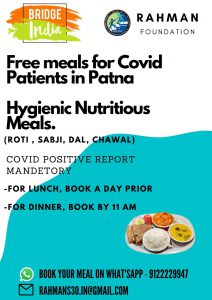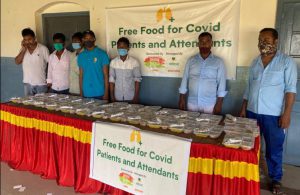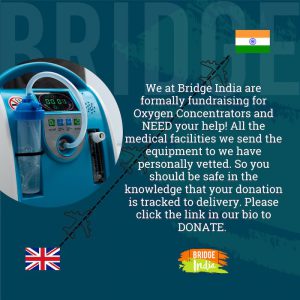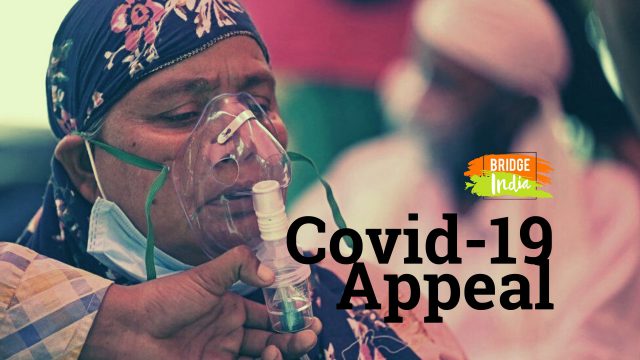India is grappling with the COVID-19 situation, while Indian-diaspora-driven organisations across the world have stepped up their efforts to help Indians tide over this most challenging time. UK-based Bridge India, a non-profit think tank dedicated to the discourse on public policy, is one such organisation that has done phenomenal work in the past week.
The esteemed Members have reached out for support in particular villages, towns, and other areas that the members are involved with. The proposed interventions were all ones where the Members had personal involvement and therefore could give the assurance that the donations would reach the needy on the ground, including an audit trail.
Getting in help at the right time
Logistics, management, and a long-term stream of donations are key in projects of this scale. Pratik Dattani, a member in the Bridge India Advisory Board, said that the donations have been coming in from Bridge India Members and their extended networks.
“It’s a given that Indian diaspora will support such initiatives, but we’re really grateful in particular to others that have contributed. The feedback we’ve received from these donors, who may not have known Bridge India just a few weeks ago, is that they appreciate the regular updates, information, and progress of our projects we share. It helps them understand how their support has directly created impact on the ground,” confirmed Pratik.
Trustee Ashwin Kumaraswamy spoke with the High Commission of India in London to collaborate on their existing efforts. “We understood that if we provided oxygen concentrators to them, they would be distributed via the Red Cross across India per the government’s allocations. This didn’t fulfil our requirement of having an audit trail, because we essentially would not be told where our medical supplies have gone, or when.”
“With some other wonderful organisations in the UK, we felt they were best placed to support their own micro-communities in India well. The ethos of Bridge India is to provide support across communities, regardless of their social or religious identifiers, so we felt we could best address India’s needs by assisting Members with their recommended projects. Given the seniority of our Members, mostly in management or influential positions in business or elsewhere, we could play a bigger co-ordination role to help scale and multiply other charities’ efforts too. For example, we’ve done this with the Women’s India Association UK and Punjab National Bank,” said Ashwin.
The work done so far:
While the process is ongoing and the Bridge India members have a vision of their continued support in the coming months, here is a snapshot of the work done so far from a report shared with donors:

- 1,000 food rations / week to Covid-positive patients: This is continuing for Muzaffarpur (Bihar), and will start in Patna this week.
- 4 oxygen concentrators: These have so far been stuck in Customs. Once we’ve been sent the automated link to pay the Duty, these will be released.
- 7 more concentrators departing London on Monday. Three go to Punjab National Bank staff in Delhi, two to the Joint Women’s Programme in Gurgaon thanks to the wonderful Women’s India Association UK, one to Harda district close to Indore, one to Samruddha Bharat Foundation in Delhi.
- 3 more concentrators have been paid for to be delivered by 19 May.
- Converting a van into a makeshift private ambulance to deliver at the Agratha Kreeda Foundation. Conversations continue with the District Collector for setting up a 50-bed facility. Before our support, they were already doing some great work Uttarahalli in Bangalore.
- Food distribution for Agratha Kreeda: During the pandemic so far, they have served 225,000+ meals, 2,500+ grocery kits, 1,000+ medical and sanitation kits. During this wave, they are also coordinating with different hospitals and the local government body, BBMP, to accommodate 500+ patients a day in desperate need of hospital beds, oxygen, and blood plasma facilities.
- Creating a makeshift hospital with 25 beds in Sareikela Kharsawa district (Jharkhand). The team has purchased (independently of us) 5 concentrators for delivery in 2 weeks. If they are of high quality, they will advise us how many more they wish to purchase, for us to fund.
- Some of our Members have also been involved in building and maintaining a 25-bed facility in Sarkej (a suburb of Ahmedabad), with a centralised oxygen facility. For more updates, you can look up Bridge India’s Instagram, Facebook, LinkedIn, Twitter feeds.
The right collaborations
It is imperative to choose partners carefully for maximising the impact through proper distribution and allocation in the areas of India where it is needed the most. The members have come forward to identify and mobilise these collaborations.
The Samruddha Bharat Foundation has been responsible for coordinating activities supporting people find access to healthcare in Delhi and elsewhere across the country, and their reach is continually extending. It is a wonderful organisation that works very much bottom-up and again, gives us confidence that there will be impact generated for every £1 donated to them.
Similarly, Paras Healthcare’s management have been big supporters of Bridge India, and Dr Sarfraz Ashraf, working with the NHS as a psychiatrist, and a member of the Advisory Board at Bridge India, confirmed that working with them have been critical to understand the ground realities in hospitals.
“Paras Healthcare’s management have been big supporters of Bridge India, and working with them has been a pleasure to understand ground realities in hospitals. Likewise, the organisations in Patna and Muzaffarpur are real grassroots-led initiatives. These are parts of the country where healthcare infrastructure is not fit for purpose given the population density and, where getting a private ambulance from a satellite town of Patna, like Dharbhanga, to Patna’s hospitals costs upwards of Rs 20,000 (£200). That could be several months’ salary for many people. So we know the work we do will help those sorely in need, and our impact will be higher. We are about to commence projects in close collaboration with local District Magistrates,” Dr Sarfraz said.
Shashank Achar, the Founder of the Agratha Freeda Foundation India said that the donations are being utilised to set up a basic ambulance and a 50-bed Covid care centre. “We strongly believe that this is our tiny contribution to the feet of Bharat Mata. Our mission is to serve the needy, without any religious or political affiliation.”

Challenges and outcomes
A project this size cannot be bereft of challenges, and one that they are currently facing is a consignment being stuck in India, even after arriving safely. In another update report shared with the donor Members, Bridge India mentioned that oxygen concentrators that arrived from the UK were yet to get customs clearance in India. The report stated:
- 4 oxygen concentrators were due to land last Thursday courtesy of Tony F, but are still showing “In Transit” as of this morning. They are for delivery to Paras Healthcare in Gurgaon (Haryana).
- 1 more concentrator has arrived in London, and waiting for delivery of 10+ more to the Joint Women’s Programme in Gurgaon and St Joseph’s Prashanth Nivas in Mangalore (Karnataka) thanks to the wonderful Women’s India Association UK. Another 3 paid for today, for delivery by 19 May in Delhi and Bangalore, and another 5 by the CSR wing of an Indian corporate in London.
- 1,000 food rations / week to Covid-positive patients (Package 1: Rice, Dal, Roti, Veg Curry; Package 2: Dry Items like Corn Flakes, Oats, Chura, Milk. Sugar, Parle-G Biscuits, 0.5kg Fruit) to Patna and Muzaffarpur (Bihar). Ongoing activity each week. See update on Facebook here and some pictures attached.
- Converting a van into a makeshift private ambulance including with a bed, oxygen cylinders, and defibrillator, and contributing to trained paramedic, trained driver, ongoing maintenance, duty doctors, bed rental, medicines costs in Bangalore (Karnataka) with Agratha Kreeda Foundation (see attached). Approval received from District Collector for setting up a 50-bed facility.
- Creating a makeshift hospital with 25 beds in Sareikela Kharsawa district (Jharkhand), including leased oxygen concentrators (none are available locally to buy). The team on the ground is waiting for approval from the District Collector before this can go ahead. Heavy rains the last couple of days have delayed this so we will have an update later this week.
- Some of our Members have also been involved in building and maintaining a 25-bed facility in Sarkej (Gujarat), with a centralised oxygen facility. See a video on LinkedIn here.
- Potentially arranging for delivery of 10k+ masks by air freight to some of the above locations next week – tbc.
Bridge India suggests that India continues to impose GST (VAT in the UK) on vaccines (5%), ambulances (28%), PPE (12% if above Rs 1,000), hand sanitisers (18%), ventilators (12%) and oxygen concentrators (28%, changed to 12% a few days ago). The Ministry of Finance today has advised it does not intend to waive these taxes. Note: A 28% GST is usually reserved for Demerit items (which means “luxury” = e.g. staying in a 5-star hotel; or “sinful” = e.g. alcohol, colas). Until last week, oxygen concentrators were taxed at that level.
Responding to the crisis, Ashwin confirmed that “for future shipments of concentrators, what we have done is order them directly into India, via Indian vendors. Unfortunately this means paying a premium, as well as 12% GST. The best way to help serve India today is for relevant authorities to streamline processes for NRIs, OCIs, and others supporting the country, rather than leaving room for discretion in the application of the rules.”
Member responses from all walks of life
Members from all walks of life have come forward to help Bridge India streamline these donations and make the most of the present situation. Yaning Wu, a student at UCL said: “I have friends in India and heard about BI through a former intern. I’m privileged to use my skills and experience to help the organisation reach its COVID-19 fundraising targets.”
 Frances Malhotra, the Charity coordinator for Women’s India Association of the UK, one of Britain’s oldest Asian Charities, said that they have followed the vision of their founder Mrs Vijaya Laxmi Pandit. The WIA have nine ongoing projects that provide education and rehabilitation of women and children in India and the UK. “The organisations we support are defined by their low administrative costs and steady long term commitment to the weakest in society. Our emergency appeal for oxygen concentrators was done differently from our usual fundraising, only through word of mouth and Whatsapp groups. We have a wide base of members, friends, and supporters who we rely on, including Bridge India,” she confirmed.
Frances Malhotra, the Charity coordinator for Women’s India Association of the UK, one of Britain’s oldest Asian Charities, said that they have followed the vision of their founder Mrs Vijaya Laxmi Pandit. The WIA have nine ongoing projects that provide education and rehabilitation of women and children in India and the UK. “The organisations we support are defined by their low administrative costs and steady long term commitment to the weakest in society. Our emergency appeal for oxygen concentrators was done differently from our usual fundraising, only through word of mouth and Whatsapp groups. We have a wide base of members, friends, and supporters who we rely on, including Bridge India,” she confirmed.
Members have been supportive so far, and are committed to their continued support. “Bridge India as an organisation promotes focus on India issues and does excellent charitable work through partnerships to directly reach and support the needy,” said Pravin Sodha, a Member.
Another Member, Jack Green said that the pandemic has caused desperate harm everywhere especially in countries which do not have the resources to fight it. “So it is the responsibility of all UK communities to give aid to those nations which are least able to support themselves.”
Bridge India is also in touch with multiple other organisations fundraising in the UK and elsewhere, including the Alhambra US Chamber, BAME In Property, Art of Living, DHL, and several others.
It is heartening to see organisations like Bridge India take some kind of control in helping out the citizens of India in these desperate times. This goes to show how passionate Indians are about their homeland, no matter how far they roam around the globe. We at Global Indian Stories hope that their efforts can help save many lives and that the obstacles in their way can be resolved quickly. Delays will only risk the survival of even more people.
Smita is a multi-cultural freelance journalist, writer, and filmmaker based out of the US, London, Hong Kong, and India. Global Indian Stories is her brain-child. Created to chronicle diaspora stories written by Indians of all age groups, from different walks of life across the globe, Smita makes sure that the platform remains inclusive and positive.


![Powerful Pride documentary Legendary Children [All Of Them Queer] streaming very soon](https://globalindianstories.org/wp-content/uploads/2025/06/Legendary-streaming-release-featured-238x178.jpg)



![Powerful Pride documentary Legendary Children [All Of Them Queer] streaming very soon](https://globalindianstories.org/wp-content/uploads/2025/06/Legendary-streaming-release-featured-100x75.jpg)

